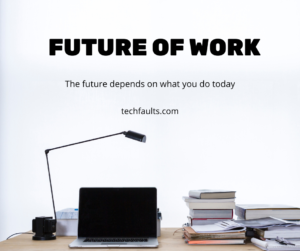Introduction
The Impact of Technology on the Future of Work
Technology is rapidly changing the way we work and do business. From automation to artificial intelligence, technology is transforming industries and reshaping the future of work. Individuals and companies must adapt and prepare for the changes as technology advances.
The future of work is becoming more technology-driven. Machines and automation are now replacing jobs that humans once did. This shift is not only changing the way we work but also the skills that are in demand in the job market. For companies to remain competitive, they must stay abreast of technological advancements and develop new skills.

The Rise of Automation: How Machines are Taking Over Jobs
A key factor driving the transformation of the future of work is automation. Machines and robots are increasingly replacing jobs that humans once did. Increasing the productivity and efficiency in the workplace can be a benefit, but if jobs h lost due to automation, it can be a challenge for workers.
The benefits of automation in the workplace are evident. By automating repetitive tasks, businesses can save money and become more productive. And automatically reduces the risk of human error, leading to higher-quality results. Further, automation allows companies to operate 24/7, as machines do not require breaks or rest.
However, the rise of automation also raises concerns about job displacement. As machines take over tasks that humans traditionally did, many workers may find themselves unemployed or needing retraining. This calls for a shift in how we think about work and the skills valued in the job market. Individuals need to adapt and acquire new skills that cannot be easily automated, such as critical thinking, creativity, and emotional intelligence.
The Gig Economy: The Emergence of Freelance Work

The gig economy is another significant trend shaping the future of work. More people work as freelancers, taking on short-term projects or gigs rather than traditional full-time employment. This shift is driven by various factors, including the desire for flexibility, autonomy, and the ability to work on multiple projects simultaneously.
The gig economy offers several benefits for both workers and businesses. For workers, freelancing provides the flexibility to choose when and where to work, allowing for a better work-life balance. Freelancers also have the opportunity to work on various projects, gaining diverse experiences and expanding their skill sets. Hiring freelancers will enable businesses for greater flexibility in scaling their workforce based on project demands. It also provides access to the global talent pool, as freelancers can work remotely from anywhere.
However, working in the gig makes economy also presents challenges. Freelancers often face income instability and a lack of Gig Engineering. They are also responsible for finding clients and managing their finances. Additionally, the gig makes the economy highly competitive, as freelancers must constantly market themselves and stay updated with the latest industry trends to remain competitive.
Remote Work: The Benefits and Challenges of Working from Home

Remote work is becoming common as technology allows us to work from anywhere. The COVID-19 of 2020 pandemic has further accelerated this trend, with many companies adopting remote work policies to ensure business continuity. Remote work offers many benefits for employees.
For employees, remote work provides the flexibility to work from the comfort for their homes, eliminating the need for commuting and allowing for a better work-life balance. Remote workers also have the opportunity to live and work from anywhere in the world as long as they have a stable internet connection. It opens up new possibilities for individuals who may need access to job opportunities in their local area.
For employees, remote work can lead to increased productivity and cost savings. Many types of research have shown remote workers are often more productive than their office-based basics, as they have few distractions and can create a personalized work environment. Remote work also allows businesses to tap into a global talent pool, as they are not limited by geographical boundaries when hiring.
However, remote work also presents challenges. Communication and collaboration can more difficult in remote work, as employees are physically present in a different location. Technology tools and platforms are required to facilitate virtual meetings and project management. Moreover, remote work can lead to isolation and a lack of work-life boundaries, as the line between work and personal life becomes blurred.
Artificial Intelligence: The Role of AI in the Workplace
Artificial intelligence (AI) has been more common in the workplace.AI analyzes human brain power in machines programmed them to think and learn like as humans. Artificial intelligence processing is used in various industries to perform automatic tasks, analyze data, and make predictions.
The benefits of using AI in business are significant. AI can automate repetitive tasks, freeing employees’ time to focus on more complex and strategic work. It can also detect large amounts of data quickly and perfectly, providing valuable insights for decision-making. AI-power chatbots and virtual assistants can enhance customer service by providing instant responses and personalized recommendations. Additionally, AI can improve efficiency and reduce costs by optimizing processes and workflows.
However, the adoption of AI in the workplace also poses challenges. One main concern is job displacement, as AI technologies can potentially replace jobs that humans once did. This calls for a shift in the skills valued in the job market, emphasizing skills that cannot be easily automatic, such as critical thinking, problem-solving, and creativity. Some ethical considerations surround using artificial intelligence, such as privacy and bias issues. Businesses need to implement AI technologies responsibly and ethically.
Augmented Reality: How AR is Changing the Way We Work
Augmented Reality (AR) is another technology changing how we work. Augmented Reality refers to the top of digital information in the real world, improving our perception and interaction with the environment. AR technologies, such as smart glasses and mobile applications, are used in various industries to provide real-time information, improve training and education, and enhance visualization and collaboration.
AR offers several benefits in the workplace. It can provide workers with real-time information and instructions, improving efficiency and reducing errors. For example, you can be used in manufacturing to guide workers through complex assembly processes or assist surgeons during surgeries in healthcare. AR can also be used for training, allowing employees to practice and simulate real-world scenarios in a safe and controlled environment. Additionally, AR can enhance collaboration by allowing remote workers to visualize and interact with data in a shared virtual space.
However, the adoption of AR in business also presents challenges. One of the main challenges is the cost of implementing AR technologies, as they often require specialized hardware and software. Additionally, there may be resistance to change and a learning curve associated with AR technologies. Businesses must carefully evaluate the potential benefits and challenges of implementing AR and ensure that it aligns with their business objectives.
Blockchain Technology: The Potential of Blockchain in Business
Blockchain technology has been potential to revolutionize the way we do business. Blockchain is a decentralized and distributed keeping of records of transactions across multiple computers. It provides transparency, security, and immutability, making it is perfect for many applications, such as supply chain management, financial transactions, and identity verification.
The benefits of using blockchain in business are significant. Blockchain can increase transparency and trust by providing a tamper-proof record of transactions. It can also reduce costs and inefficiencies by removing the need for middleman and streamlining processes. For example, blockchain can used in supply chain management to track and trace products from the source to the end consumer, ensuring authenticity and reducing the risk of counterfeit goods. Additionally, blockchain can enable new business models and opportunities, such as decentralized finance and peer-to-peer marketplaces.
However, the adoption of blockchain in business also poses challenges. One of the main challenges is scalability, as blockchain networks can slow and have limited capacity compared to traditional centralized systems. Additionally, there may be regulatory and legal considerations surrounding the use of blockchain, as it involves the storage and transfer of sensitive data. Businesses must carefully evaluate the potential benefits and challenges of Implementation blockchain and ensure that it aligns with their business objectives.
Cybersecurity: The Importance of Protecting Your Business from Cyber Threats
Cybersecurity becomes increasingly important as more businesses t done online. With the rise of technology and digitalization, enterprises have become more anxious about cyber threats such as data breaches, ransomware attacks, and phishing scams. Businesses must prioritize cybersecurity and implement robust measures to protect their data and systems.
The risks of cybersecurity in business are significant. A data defeat can result in financial losses, reputational damage, and legal consequences. It can also lead to a loss of customer trust and loyalty. Cyberattacks are becoming more sophisticated and targeted, making it essential for business to stay updatewith the latest security technologies and practices. Furthermore, companies must ensure that their employees trained in cybersecurity have best practices and are aware of potential threats.
The challenges of cybersecurity in business are numerous. Cyber threats constantly evolve as hackers look for new ways to exploit vulnerabilities. It requires companies to proactively approach cybersecurity, regularly updating their systems and implementing security patches. Additionally, there may be a need for cybersecurity professionals, making it difficult for businesses to find and retain skilled talent. o companies need to invest in cybersecurity and prioritize the protection of their data and systems.
The Skills of the Future: What Skills Will Be in Demand in the Future of Workplace?
The skills that will be in demand in the future of workplace are changing. Technologies are shifting towards skills that machines cannot easily automate or replicate. Keeping up with technological advancements and developing new skills is necessary to remain competitive in the job market.
Critical thinking is one of the essential skills that will be in demand in the future of workplace. With the rise of automation and AI, there is a greater need for individuals who can analyze complex problems, think creatively, and make informed decisions. Critical thinking involves evaluating information, identifying patterns, and proposing innovative solutions.
Another essential skill for the future of workplace is adaptability. As technology continues to evolve, individuals must be able to adapt to new tools, platforms, and ways of working. I require a growth mindset and a willingness to learn and acquire new skills. Adaptability also involves being open to change and embracing new opportunities.
In addition to critical thinking and adaptability, other skills that will be in demand in the future of workplace include creativity, emotional intelligence, and digital literacy. A person who invents can think through the box, generate new ideas, and develop proper solutions to problems. Individuals with emotional intelligence can manage their emotions, develop strong relationships, and collaborate effectively with others. Digital literacy involves using and navigating digital technologies and understanding their implications and potential risks.
Conclusion:
Preparing for the Future of Work in a Technology-Driven World
The future of work is becoming more technology-driven. From automation to artificial intelligence, technology is transforming industries and reshaping the way we work. Individuals and businesses must adapt and prepare for the changes technology will bring to the workplace.
To prepare for the future of work, individuals must develop new skills and stay updated with the latest technological advancements. It involves continuous learning and acquiring new knowledge and competencies. It also requires a mindset of adaptability and a willingness to embrace change.
For businesses, investing in technology and prioritizing digital transformation is essential. It involves:
- Adopting new tools and platforms.
- Implementing automation and AI technologies.
- Ensuring robust cybersecurity measures.
It also requires a focus on developing a culture of innovation and continuous improvement.
In conclusion, the future of work is being to shaped by technology. From automation to artificial intelligence, technology is transforming industries and reshaping the way we work. Individuals and businesses need to adapt and prepare for the changes. We can thrive in a technology-driven world by developing new skills, embracing technology, and prioritizing innovation.